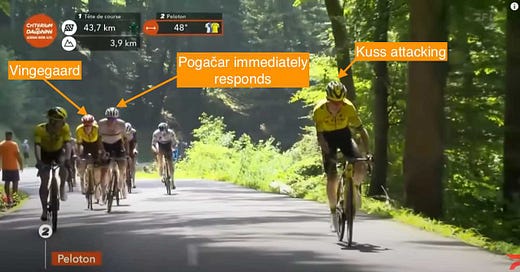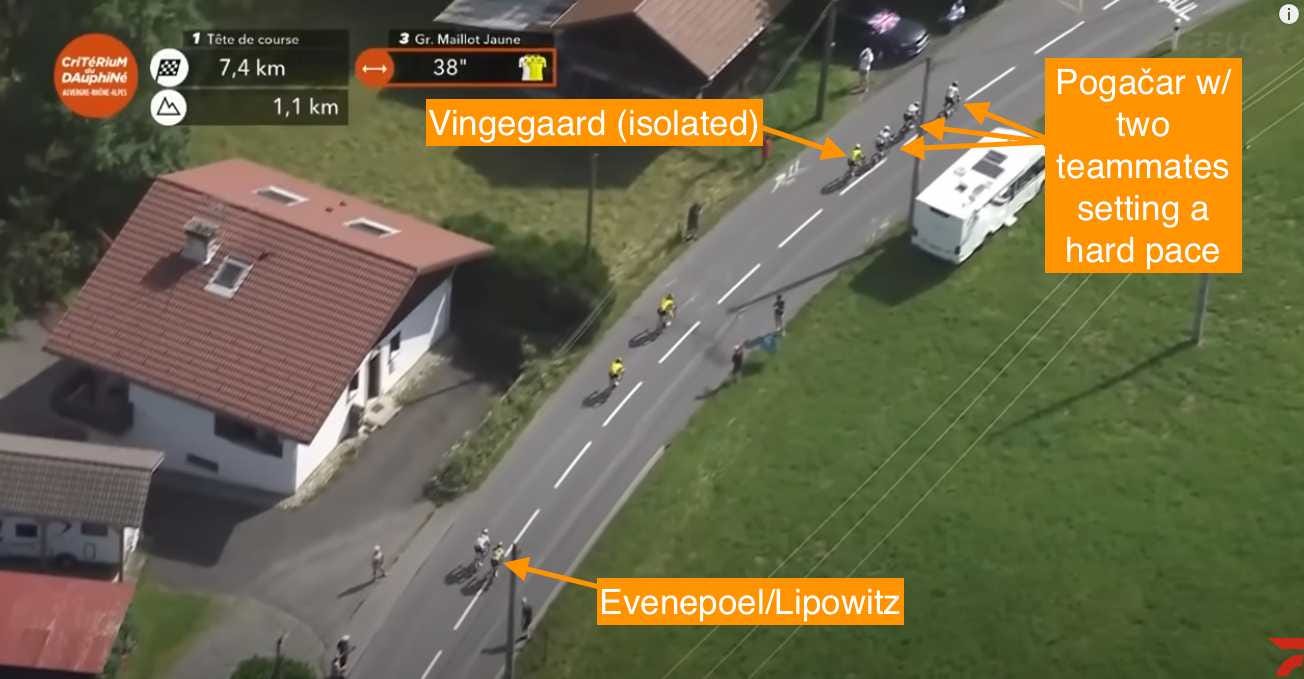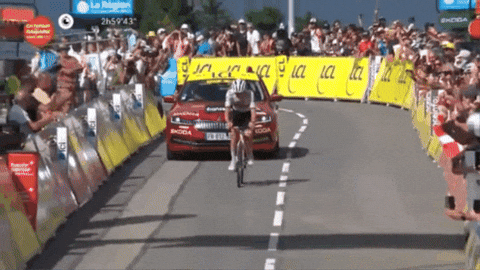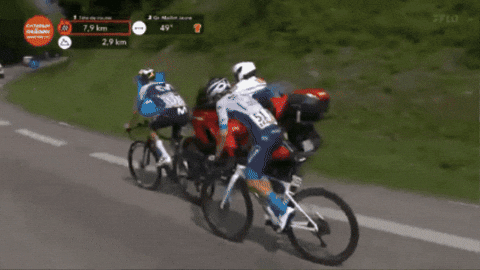Key Takeaways: Critérium du Dauphiné Final Weekend
Breaking down what Tadej Pogačar's dominance at the eight-stage Critérium du Dauphiné tells us about the upcoming Tour de France
At this past weekend’s traditional Tour de France dress rehearsal, the Critérium du Dauphiné, Tadej Pogačar both fed hope to fans wanting to see a competitive Tour de France with a disappointing Stage 4 time trial performance, and reminded everyone why he is defending Tour champion, along with winning nearly every other major race on the calendar, by storming back with a chillingly dominant three days in the Alps to win his first career Dauphiné. Considering the race is set in the Rhône-Alpes region of the French Alps and serves as a dry-run for the Tour’s biggest mountain stages, this was a major blow for any other riders hoping to contend for the GC at the upcoming race.
Final GC Top Ten
1) Tadej Pogačar (UAE Team Emirates-XRG) +0
2) Jonas Vingegaard (Visma-Lease a Bike) +59″
3) Florian Lipowitz (Red Bull-BORA-hansgrohe) +2:38
4) Remco Evenepoel (Soudal Quick-Step) +4:21
5) Tobias Halland Johannessen (Uno-X Mobility) +6:12
6) Matteo Jorgenson (Visma | Lease a Bike) +7:28
7) Enric Mas (Movistar) +7:57
8) Paul Seixas (Decathlon AG2R La Mondiale) +8:25
9) Carlos Rodríguez (INEOS Grenadiers) +8:57
10) Guillaume Martin (Groupama-FDJ) +10:01
Check out the highlights from the final three days of racing, along with a few Key Takeaways to understand the implications of Pogačar’s dominant win over his biggest Tour rival, Jonas Vingegaard:
Stages 6-8 Notebook
Stage 6
43.7km-to-go: On the stage’s penultimate climb, Visma, after coming into the climb with numbers on the front, has Sepp Kuss (who came into the stage 1’59 down on GC) attack. Tadej Pogačar, who is now isolated from his UAE teammates, immediately responds, with Vingegaard on his wheel, meaning he is momentarily isolated.
7.4km: However, by the base on the day’s final climb, UAE has turned the tables. With riders catching back on in the valley between climbs, they have two riders setting a brutally hard pace on the front, while Vingegaard is now isolated on Pogačar’s wheel after his Visma teammates were unable to hold the pace. Further back, Remco Evenepoel has already been dropped, and is riding with Florian Lipowitz, who burned precious energy with a hard attack on the previous climb.
7.3km: As soon as his teammates pull off, Pogačar attacks, with Vingegaard sprinting all out just holding his wheel.
7.2km: Without even standing up, Pogačar is able to crank out such a high pace that he quickly drops Vingegaard, who simply can’t hold the same high pace after marking Pogačar’s acceleration.
6.4km: Less than a kilometer later, Pogačar has put 15 seconds into Vingegaard, who in turn is nearly 30 seconds ahead of the rest of the GC contenders. Pogačar, after his initial acceleration, is still seated and seemingly effortlessly riding at 32km/h (20mph) on the climb.
1.3km: Behind, Evenepoel, the race leader heading into the stage, is over 90 seconds behind Pogačar and holding a steady pace, but one that is far too slow. Visma’s Matteo Jorgenson attacks and leaves him behind.
Finish: Pogačar crosses the finish line after potentially the best 20-minute climbing performance of his career (and maybe even cycling history), with my calculations having him at a VAM of 1857m/h and power of 494 watts (7.6w/kg).
Stage Top Three
1) Tadej Pogačar (UAE Team Emirates-XRG) +0
2) Jonas Vingegaard (Visma-Lease a Bike) +1:01
3) Florian Lipowitz (Red Bull-BORA-hansgrohe) +1:22
Stage 7:
11.9km: After an incredibly hard day with almost nothing but mountain passes, Pogačar attacks as soon as his last UAE teammate is used. Again, only Vingegaard can respond, but this time, the move is so violent, and after such a hard day of climbing, that Vingegaard has to quickly back off and let the wheel go to avoid imploding.
11.1km: After the initial surge, Pogačar settles into a more sustainable pace (still roughly 450 watts), with Vingegaard doing the same just a few seconds back.
Finish: After a long pursuit, Pogačar crosses the line for the stage win, with Vingegaard coming in 14 seconds later, but looking absolutely destroyed compared to Pogačar’s ease.
Stage Top Three
1) Tadej Pogačar (UAE Team Emirates-XRG) +0
2) Jonas Vingegaard (Visma-Lease a Bike) +14”
3) Florian Lipowitz (Red Bull-BORA-hansgrohe) +1:21
Stage 8:
10.5km: For the third consecutive day, Visma attempts to leverage their superior numbers by having a rider vaguely in the GC battle (this time Matteo Jorgenson) attack, forcing Pogačar to respond, and, in the process, shed his own teammates.
7.9km: Up front, Lenny Martinez attacks his breakaway companion Enric Mas, and heads off in an attempt to hold off the fast-closing peloton 48 seconds behind.
6.6km: Behind, Jonas Vingegaard attacks, with Tadej Pogačar following with ease, setting up a stark contrast to Vingegaard’s labored attempts on the two previous stages.
Finish: Even with Vingegaard chasing, and Pogačar taking half-hearted pulls, Martinez holds off the superstar chasers to get a massive stage win. Even with Vingegaard hiding in the wheels to wind up for the sprint for second, Pogačar refuses to contest, leaving a disappointed Vingegaard to roll in for second.
Stage Top Three
1) Lenny Martinez (Bahrain-Victorious) +0
2) Jonas Vingegaard (Visma-Lease a Bike) +34”
3) Tadej Pogačar (UAE Team Emirates-XRG) +34”
Three Key Takeaways
1) History Tells us Tadej Pogačar’s Ride at the Dauphine Bodes Very Well for His Tour Chances: Despite a slight wobble in the Stage 4 time trial, where Pogačar ceded 48 seconds to Remco Evenepoel and 20 seconds to Jonas Vingegaard after appearing to struggle with both his aerodynamic setup and the hot weather, his performance in the mountains has us leaving this week feeling like the Tour de France overall win is almost already sewn up.
This might sound hyperbolic, and there is always the chance a crash or illness derails Pogačar’s Tour campaign, but Pogačar romped through the eight-day race against the sport’s highest level of GC competition, winning by nearly a minute even after suffering a bad day in the time trial.
To put this achievement into perspective, since 2012, four other riders have won the Dauphine by 58 seconds or more, and all four have gone on to win the Tour de France a few weeks later (Wiggins, Froome, Thomas, Vingegaard).
2) Pogačar is Unbeatable in His Current Form: The scariest thing about Pogačar’s Dauphine performance is that with a month remaining to the 2025 Tour’s first mountain stages, he is currently nearing the record-breaking climbing form he displayed at last year’s Tour.
In fact, his performance on Stage 6, where he decimated the rest on the same climb where Vingegaard put him to the sword in the final time trial of the 2023 Tour de France, was potentially one of the best 20-minute climbing performances in the history of the sport.
Pogačar 2025 Dauphine Power Numbers on Key Climbs:
Stage 6 Combloux* Climb
Duration: 19:58
Power: 7.5w/kg, 494w (assuming 65kgs at calculated average power)
VAM: 1857m/h*The peak altitude of the climb was just over 1,100 meters (3,900ft), which is much lower than other performance reference points
Stage 7 Valmeinier Climb
Duration: 39:23
Power: 6.8w/kg, 445w (assuming 65kgs at calculated average power)
VAM: 1701m/h
Pogačar 2024 Tour de France Peak Climbing Performances:
Stage 14 (Pla d'Adet)
Duration: 24:35
Power: 6.9w/kg, 443w (assuming 64kgs at calculated average power)
VAM: 1837Stage 15 (Plateau de Beille)
Duration: 39:50
Power: 6.98w/kg, 447w (assuming 64kgs at calculated average power)
VAM: 1887
Naturally, these performances may spark concerns that Pogačar has ‘peaked too soon’ and won’t be able to replicate this at the upcoming Tour, but recent history suggests that this isn’t factual, with the most dominant Dauphine performers all going on to continue to improve before the Tour.
In fact, being Tour fit at the Dauphine is a major advantage, since polishing off form is far easier and less difficult on a rider’s body than attempting to cram for the final exam with just a few weeks remaining.
3) What to Make of the Battle Behind: Behind Pogačar, two-time Tour winner Jonas Vingegaard stands alone as a rider who can realistically challenge the Slovenian for the overall Tour title. After all, he is one of only two riders (the other being Primož Roglič) to beat Pogačar in a stage race since he won his first Tour title in 2020, and has done it twice on the sport’s biggest stage.
However, even with Vingegaard putting in what must be some of his career-best climbing performances to stay within a minute of Pogačar, and nearly 3.5 minutes ahead of Evenepoel, he still has a basic math problem of having a lower power threshold than Pogačar, meaning, when Pogačar raises the pace to create separation, he simply can’t match the increase since he has already been on his limit just following.
Even with Vingegaard clocking off-season improvements every year, when we look at the first part of the climb of Stage 6 (Domancy), which is where Vingegaard crushed Pogačar on Stage 16 of the 2023 Tour de France, we can see just how difficult it is to match Pogačar’s continued improvement, and how much it has raised the bar since just two years ago.
Domancy Climbing Time Comparison
2025 Dauphine Stage 6 Tadej Pogačar: 6’15
2025 Dauphine Stage 6 Jonas Vingegaard: 6’35
2023 TdF TT Jonas Vingegaard: 6’42
2023 TdF TT Tadej Pogačar: 7’27
Further down the podium, the 24-year-old breakout German Florian Lipowitz appears to be a legitimate budding star at RedBull-Bora-hansgrohe. Just this year, he has finished second at Paris-Nice, fourth at Basque Country, and third at the Dauphine, a hugely impressive haul for a rider who just became a viable stage racer twelve months ago.
Outside of highlighting his chances at a potential podium contender at the Tour, the ride from Lipowitz highlighted just how much last year’s Tour 3rd place finisher Remco Evenepoel has fallen behind his biggest GC competitors.
Despite coming into this race in incredible form, which he showed en route to winning the Stage 4 time trial, his steady-state climbing efforts are simply too slow to limit his losses to the best climbers, with even Lipowitz putting minutes into him over the final three mountain stages.
Even if Evenepoel were to improve his ability to limit his losses on the climbs in the coming weeks, losing even little bits of time in the mountains is almost incompatible with winning at the Tour in modern cycling, since gains in time trials over Vingegaard and Pogačar are limited to a handful of seconds.


















Hi, did anyone else sense Tadej seemed a little ‘down’, maybe even bored at the Dauphine? His energy seemed low, almost blasé; smiling when needed, or expected, i.e., on the podium. He didn’t convey his usual effervescent s p i r i t, more blasé than excited for his first overall Dauphine victory. (?) Thanks for the great summary, Spencer.
It appeared that this race was very much about Tadej keeping his powder dry after dominating on stage 6. The talk after that stage was about his 100th win, which he stated he wanted to occur at the TDF. I think that’s why he didn’t make a big effort chasing down Martinez on the final stage.